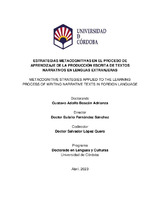Mostrar el registro sencillo del ítem
Estrategias metacognitivas en el proceso de aprendizaje de la producción escrita de textos narrativos en lenguas extranjeras
| dc.contributor.advisor | Fernández Sánchez, Eulalio | |
| dc.contributor.advisor | López Quero, Salvador | |
| dc.contributor.author | Boscán Adrianza, Gustavo Adolfo | |
| dc.date.accessioned | 2023-12-21T08:04:10Z | |
| dc.date.available | 2023-12-21T08:04:10Z | |
| dc.date.issued | 2023 | |
| dc.identifier.uri | http://hdl.handle.net/10396/26408 | |
| dc.description.abstract | Se propone un modelo de enseñanza teórico-procedimental fundamentado en los procesos metacognitivos para optimizar las destrezas en la producción de textos narrativos de estudiantes de lenguas extranjeras en diferentes niveles de la escuela secundaria en los Estados Unidos de América. Basado en crecientes investigaciones en el área de lingüística aplicada, este estudio es sobre la efectividad de las estrategias de aprendizaje empleadas por estudiantes de idiomas extranjeros (Wenden, A. y Rubin J. (1987); Cohen, A. (1998); O’Malley, J. y Chamot, A. (1990); Oxford, R. (1990); entre otros. Estos investigadores han puesto en práctica una serie de hipótesis respaldando los estudios sobre estrategias de aprendizaje, empleando las técnicas de observación y corrección de producciones textuales basadas en estrategias. Esta investigación es un estudio etnográfico, indicando una delineación no experimental con intervención pedagógica donde los procesos se describen como suceden y se da la mediación pedagógica del investigador, ya que la metacognición es andamiada durante la investigación. Este se trata de un estudio de carácter cualitativo en el cual se recolectan datos través de diferentes instrumentos introspectivos. Se clasifica como una investigación-acción, pues se encuentra en el campo de la práctica de la enseñanza-aprendizaje. Los métodos y herramientas de análisis destacan que el aspecto más importante del trabajo de escritura pareciera residir en la progresión y el uso cíclico de estos componentes. Se pudo concluir que las estrategias metacognitivas y autorreguladoras manejadas por el profesor y el estudiante deben estar presentes antes, durante y después del proceso de escritura. La enseñanza efectiva se basa en la transferencia de control y la práctica guiada en contextos dialógicos entre el docente y los aprendices. Estas estrategias deben ser tomadas en cuenta no solo por los actores directos de la situación educativa sino más ampliamente por diseñadores de programas educativos y por creadores de materiales didácticos. | es_ES |
| dc.description.abstract | The main objective of this research is to propose a theoretical-procedural teaching model based on metacognitive processes. It attempts to optimize the narrative text production skills of foreign language American high school students. Based on recent investigation in Applied Linguistics, this study is about the effectiveness of learning strategies applied by foreign language students (Wenden, A. and Rubin J. (1987); Cohen, A. (1998); O’Malley, J. and Chamot, A. (1990); Oxford, R. (1990); among others. These researchers have strengthened the studies on learning strategies through observation techniques and correction of text production based on metacognitive strategies. This study is an ethnographic research which indicates a non experimental delineation with pedagogic intervention. Processes are described as they happen and there is the researcher's pedagogical mediation since metacognition is scaffolded all along the research. This is qualitative research and data is collected using introspective tools. It is classified as an action-oriented research, since its field is teaching and learning practice. A useful amount of learning exercises based on metacognitive strategies were put into practice. They allowed it to sustain a favorable development in the production of narrative texts. The analysis tools and methodology bring to light that the most important aspect in writing is anchored in the progression and the cyclical use of these components. It is concluded that metacognitive and self regulating strategies handled by teacher and student must be present before, during and after the writing process. Effective teaching relies on control transfer and the guided practice in dialogic contexts between teacher and students. These strategies must be taken into account not only by the direct actors of the educational scenario but also by designers of educational programs and creators of didactic material. | es_ES |
| dc.format.mimetype | application/pdf | es_ES |
| dc.language.iso | spa | es_ES |
| dc.publisher | Universidad de Córdoba, UCOPress | es_ES |
| dc.rights | https://creativecommons.org/licenses/by-nc-nd/4.0/ | es_ES |
| dc.subject | Escritura | es_ES |
| dc.subject | Narrativa | es_ES |
| dc.subject | Lenguas extranjeras | es_ES |
| dc.subject | Estrategias de aprendizaje | es_ES |
| dc.subject | Metacognición | es_ES |
| dc.subject | Writing narrative texts | es_ES |
| dc.subject | Foreign languages | es_ES |
| dc.subject | Learning strategies | es_ES |
| dc.subject | Metacognition | es_ES |
| dc.title | Estrategias metacognitivas en el proceso de aprendizaje de la producción escrita de textos narrativos en lenguas extranjeras | es_ES |
| dc.title.alternative | Metacognitive strategies applied to the learning process of writing narrative texts in foreign language | es_ES |
| dc.type | info:eu-repo/semantics/doctoralThesis | es_ES |
| dc.rights.accessRights | info:eu-repo/semantics/openAccess | es_ES |

